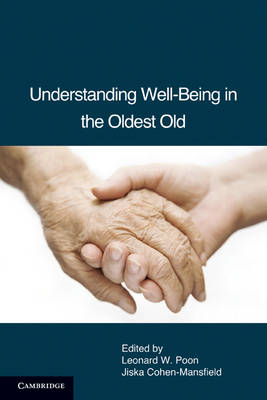
Understanding Well-Being in the Oldest Old
Cambridge University Press (Verlag)
978-0-521-13200-8 (ISBN)
The demographic and social structure of most industrialized and developing countries are changing rapidly as infant mortality is reduced and population life span has increased in dramatic ways. In particular, the oldest old (85+) population has grown and will continue to grow. This segment of the population tends to suffer physical and cognitive decline, and little information is available to describe how their positive and negative distal experiences, habits and intervening proximal environmental influences impact their well-being, and how social and health policies can help meet the unique challenges they face. Understanding Well-Being in the Oldest Old is the outcome of a four-day workshop attended by U.S. and Israeli scientists and funded by the U.S.-Israel Bi-National Science Foundation to examine both novel and traditional paradigms that could extend our knowledge and understanding of the well-being of the oldest old.
Leonard W. Poon is University of Georgia Distinguished Research Professor and Professor of Public Health and Psychology. He is also Director of the Institute of Gerontology and the Georgia Geriatric Education Center, Chair of the Faculty of Gerontology and Executive Director of the International Centenarian Consortium. He was Director of the National Institute of Health's funded Georgia Centenarian Study from 1988 to 2009. Dr Poon's primary research interests are longevity and survival of the oldest old by using a multidisciplinary approach to examine the contributors and predictors of functional capacities, life satisfaction, quality of life, personality and ability to cope, as well as genetics, environment and neuropathological contributions to longevity. His other research interests are on normal and pathological changes in memory and learning, the impact of exercise on cognition, and clinical diagnosis of early dementia. He has more than 33 research grants and has published more than 160 articles and books. Jiska Cohen-Mansfield is a professor in the Department of Health Promotion at Tel Aviv University and a professor at the George Washington University Medical Center. She is also Chair of the Department of Health Promotion and Director of the Herczeg Institute on Aging at Tel Aviv University and was previously Director of the Research Institute at the Hebrew Home of Greater Washington. Her awards include the Recognition Award for Outstanding Contributions in Gerontological Research from the Maryland Gerontological Association (1994), the Barry Reisberg Award for Alzheimer's Research for advances in non-pharmacologic research and clinical treatment from Hearthstone Alzheimer's Family Foundation (2003) and the award in appreciation of outstanding contribution from Psychologists in Long Term Care (2007). She has published more than 250 articles and books and is the co-editor of Satisfaction Surveys in Long-Term Care (with F. K. Ejaz and P. Werner). She is a highly cited researcher as listed by the ISI.
1. Toward new directions in the study of well-being among the old-old Leonard W. Poon and Jiska Cohen-Mansfield; Part I. Theory: New Horizons in Well-Being Research: 2. From ageless self to selfless age: towards a theoretical turn in gerontological understanding Haim Hazan; 3. The pursuit of happiness: alternative conceptions of subjective well-being Dov Shmotkin; 4. The shifting baseline theory of well-being: lessons from across the aging spectrum Jiska Cohen-Mansfield; 5. The model of developmental adaptation: implications for understanding well-being in old-old age Peter Martin, Neha Deshpande-Kamat, Leonard W. Poon and Mary Ann Johnson; Part II. Paradise Lost: Between Trauma and Happiness: 6. Does trauma linger into old-old age: using the Holocaust experience as a paradigm Dov Shmotkin, Amit Shrira and Yuval Palgi; 7. The impact of life events on the oldest old Peter Martin, Grace da Rosa and Leonard W. Poon; 8. Post-traumatic stress disorder and its treatment at late life Lee Hyer and Catherine A. Yeager; Part III. Pathways and Gatekeepers: Moderating, Mediating, and Proximal Processes: 9. Impact of resources on successful adaptation among the oldest old Maurice MacDonald and Jinmyoung Cho; 10. Nutrition and well-being Mary Ann Johnson, Dorothy Hausman, Peter Martin, Leonard W. Poon, Elisabeth Lilian Pia Sattler and Adam Davey; 11. Cognitive functioning and vitality and well-being among the oldest old: implications for well-being Jennifer Margrett, Benjamin Mast, Maria C. Isales, Leonard W. Poon and Jiska Cohen-Mansfield; 12. Social relationship and well-being in very late life Howard Litwin; 13. Spirituality and religiosity connections to mental and physical health among the oldest old Alex Bishop; 14. Impact of leisure activity and innovation on the well-being of the very old Galit Nimrod; Part IV. Signposting Paradise: Measurement of Well-Being: 15. Culture and meaning: strategies for understanding the well-being of the oldest old Christine L. Fry and Charlotte Ikels; 16. The will to live as an indicator of well-being and predictor of survival in old age Sara Carmel; 17. The measurement of life satisfaction and happiness in old-old age Alex Bishop and Peter Martin; 18. Late life psychotherapy: challenges and opportunities to enhance well-being in the oldest old Lee Hyer, Catherine A. Yeager and Ciera V. Scott; 19. Future directions in the study of well-being Jiska Cohen-Mansfield and Leonard W. Poon.
| Zusatzinfo | 23 Tables, unspecified; 14 Line drawings, unspecified |
|---|---|
| Verlagsort | Cambridge |
| Sprache | englisch |
| Maße | 150 x 224 mm |
| Gewicht | 520 g |
| Themenwelt | Geisteswissenschaften ► Psychologie ► Allgemeine Psychologie |
| Geisteswissenschaften ► Psychologie ► Entwicklungspsychologie | |
| Geisteswissenschaften ► Psychologie ► Verhaltenstherapie | |
| Medizin / Pharmazie ► Pflege ► Altenpflege | |
| Sozialwissenschaften ► Soziologie | |
| Schlagworte | Alter |
| ISBN-10 | 0-521-13200-2 / 0521132002 |
| ISBN-13 | 978-0-521-13200-8 / 9780521132008 |
| Zustand | Neuware |
| Haben Sie eine Frage zum Produkt? |
aus dem Bereich


